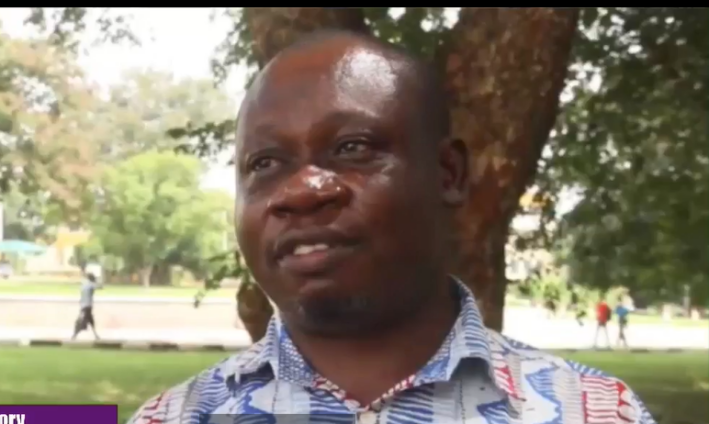A Senior Agricultural Economics Lecturer at the Kwame Nkrumah University of Science and Technology, Associate Professor Robert Aidoo, has advised the government to return to the drawing table to deliberate on its stance in the fight against illegal mining or galamsey.
According to him, although the government has constantly reiterated its commitment in the fight against the menace, it's actions do not necessarily support the claim.
His comments follow the recent disclosure by the Chief Executive Officer of the Ghana Cocoa Board, Joseph Boahen Aidoo, that Cocobod had to refund $250 million it acquired from the African Development Bank partly for irrigation purposes in cocoa farms.
According to him, the Ghana Irrigation Authority, the consultants tasked to execute the project, advised against its feasibility due to the contamination of rivers by illegal mining activities, which posed a threat to cocoa trees.
Professor Aidoo said the counsel not to go ahead with the project was a good one, and that it was time for the government to analyse the situation to determine strategies to resolve the mining issue before revenues generated from cocoa are lost.
Speaking on Joy FM’s Top Story on May 10, he said, “I think that it’s a worry that Ghana is struggling in this battle against galamsey. I think that for Cocobod to return the money, I think it is a good idea because if you go and start this project, you will be losing out completely and then paying back the loan will become a big problem for the country. So it’s a good idea that they are returning the money. But the bigger issue is how soon are we going to deal with this galamsey canker so that our farms will be free.
“Our farmers will be able to do their farming in peace… so I think that the government really has to come back quite strongly and revisit this whole fight against galamsey,” he said.
He explained that the country’s economy is tied to Ghana’s cocoa economy, and anytime issues pertaining to the production of cocoa are not handled properly, Ghana’s economy is also impacted.
“It is about the economy of Ghana, when you touch cocoa you are touching the economy of Ghana. When cocoa money doesn’t come our currency struggles. A lot of problems are encountered in the country and so I think we have to just go beyond the few people who are doing the illegal mining and pocketing the money and look at the national interest otherwise sooner than later, we will lose that whole industry Ghana has relied on for so long a time,” he cautioned.
The Associate Professor noted that research has shown that traces of mercury could be found in cocoa, explaining that if this continues, markets will no longer be available to Ghana, as these markets will not accept contaminated produce.
On the same show, the lead convener of the Media Coalition Against Galamsey, Dr Kenneth Ashigbey said that the issue about the dangers of illegal mining was bigger than what most of the government was willing to admit.
He explained that forest reserves were now heavily contaminated, and despite efforts to investigate those at the helm of such operations, most of their efforts have not yielded the necessary results.
Dr Ashigbey argued that most of the river bodies were polluted, and the Ghana Water Company has already hinted that more chemicals are now used to purify water, sometimes resulting aluminium residues in these water bodies.
He added that if these concerns are not swiftly addressed, Ghana might even have to import drinking water.
Latest Stories
-
Paris 2024: Opening ceremony showcases grandiose celebration of French culture and diversity
3 hours -
How decline of Indian vultures led to 500,000 human deaths
3 hours -
Paris 2024: Ghana rocks ‘fabulous fugu’ at olympics opening ceremony
4 hours -
Trust Hospital faces financial strain with rising debt levels – Auditor-General’s report
4 hours -
Electrochem lease: Allocate portions of land to Songor people – Resident demand
5 hours -
82 widows receive financial aid from Chayil Foundation
5 hours -
The silent struggles: Female journalists grapple with Ghana’s high cost of living
5 hours -
BoG yet to make any payment to Service Ghana Auto Group
5 hours -
‘Crushed Young’: The Multimedia Group, JL Properties surprise accident victim’s family with fully-furnished apartment
5 hours -
Asante Kotoko needs structure that would outlive any administration – Opoku Nti
6 hours -
JoyNews exposé on Customs officials demanding bribes airs on July 29
6 hours -
JoyNews Impact Maker Awardee ships first consignment of honey from Kwahu Afram Plains
7 hours -
Joint committee under fire over report on salt mining lease granted Electrochem
8 hours -
Life Lounge with Edem Knight-Tay: Don’t be beaten the third time
8 hours -
Pro-NPP group launched to help ‘Break the 8’
8 hours

